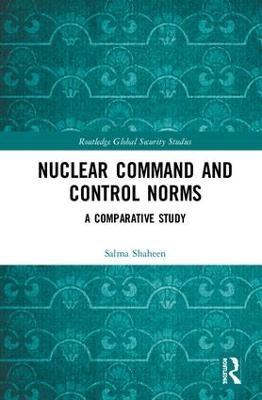
Nuclear Command and Control Norms
A Comparative Study
Seiten
2018
Routledge (Verlag)
978-1-138-34929-2 (ISBN)
Routledge (Verlag)
978-1-138-34929-2 (ISBN)
This book examines a set of dynamics that could form a global norm for nuclear command and control (C2), serving as a standard for new entrants into the nuclear club.
This book offers a new analytical framework for studying nuclear command and control (C2), based on a comparative study of four nuclear weapons states (NWS).
The subject of nuclear operations management has long been shrouded in secrecy, and whilst the importance of nuclear C2 cannot be disputed, there are few academic studies into how and why states develop these systems. This volume includes a comparative study of the development of nuclear C2 by four different NWS (Britain, China, India, and Pakistan) and demonstrates that, despite several differences, there is a central set of factors that remain constant. The analytical framework used in this study identifies key factors that can potentially shape the evolution and stability of nuclear C2. These factors include geostrategic (threat) environment, international norms, leadership, and control of nuclear operations (civil-military control). The book also analyses the interaction among different stakeholders within the nuclear C2 enterprise. It recognises that politicians, the military and scientists all have key but different roles to play, and the way these stakeholders have learned to co-exist with each other is explored. This volume offers a set of dynamics that could form a global norm for nuclear C2, serving as a standard for new entrants into the nuclear club.
This book will be of much interest to students of nuclear proliferation, global governance, and International Relations in general.
This book offers a new analytical framework for studying nuclear command and control (C2), based on a comparative study of four nuclear weapons states (NWS).
The subject of nuclear operations management has long been shrouded in secrecy, and whilst the importance of nuclear C2 cannot be disputed, there are few academic studies into how and why states develop these systems. This volume includes a comparative study of the development of nuclear C2 by four different NWS (Britain, China, India, and Pakistan) and demonstrates that, despite several differences, there is a central set of factors that remain constant. The analytical framework used in this study identifies key factors that can potentially shape the evolution and stability of nuclear C2. These factors include geostrategic (threat) environment, international norms, leadership, and control of nuclear operations (civil-military control). The book also analyses the interaction among different stakeholders within the nuclear C2 enterprise. It recognises that politicians, the military and scientists all have key but different roles to play, and the way these stakeholders have learned to co-exist with each other is explored. This volume offers a set of dynamics that could form a global norm for nuclear C2, serving as a standard for new entrants into the nuclear club.
This book will be of much interest to students of nuclear proliferation, global governance, and International Relations in general.
Salma Shaheen holds a PhD in War Studies from Kings College London, UK
Introduction 1. Analytical Framework 2. British Nuclear Command and Control 3. Chinese Nuclear Command and Control 4. Indian Nuclear Command and Control 5. Pakistan’s Nuclear Command and Control 6. Comparative Analysis of Case Studies 7. Building Nuclear Command and Control Norm
| Erscheinungsdatum | 16.10.2018 |
|---|---|
| Reihe/Serie | Routledge Global Security Studies |
| Zusatzinfo | 1 Tables, black and white |
| Verlagsort | London |
| Sprache | englisch |
| Maße | 156 x 234 mm |
| Gewicht | 453 g |
| Themenwelt | Geschichte ► Teilgebiete der Geschichte ► Militärgeschichte |
| Sozialwissenschaften ► Politik / Verwaltung ► Allgemeines / Lexika | |
| Sozialwissenschaften ► Politik / Verwaltung ► Europäische / Internationale Politik | |
| ISBN-10 | 1-138-34929-1 / 1138349291 |
| ISBN-13 | 978-1-138-34929-2 / 9781138349292 |
| Zustand | Neuware |
| Haben Sie eine Frage zum Produkt? |
Mehr entdecken
aus dem Bereich
aus dem Bereich
neueste Manipulationstechniken als Waffengattung der NATO
Buch | Softcover (2023)
Westend (Verlag)
CHF 33,55
Deutschlands Schwäche in der Zeitenwende
Buch | Softcover (2023)
C.H.Beck (Verlag)
CHF 25,20


